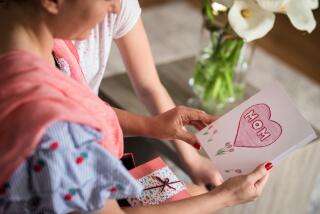China’s Moms Get Postnatal Reprieve
- Share via
BEIJING — For Wang Zan, nine months of pregnancy and a caesarean delivery were difficult enough. The last thing she wanted was a monthlong ordeal that her mother and generations of mothers before her had to endure afterward.
According to this tradition, the woman must stay in bed behind closed windows, cover her head, give up bathing, washing her hair and even brushing her teeth. She must avoid cold water, cold food, strangers, even other pregnant women (for fear they might somehow take away her breast milk). She must stuff herself with boiled eggs -- as many as 40 a day -- brown sugar and buckets of chicken and fish soup. She must minimize talking, reading, crying, anything that might deplete her energy or damage her ability to produce breast milk.
And she must live like this for a full cycle of the moon.
Older folks in China call it zuo yuezi, literally sitting through the month.
Younger people see it more like incarceration.
“I was really worried that my relatives would make me follow these rules,” said Wang, 29, an office worker who gave birth to her son this month. “They definitely wouldn’t have allowed me to shower for a month. I wouldn’t have been able to stand that.”
The tug of tradition remains strong. Despite some recent loosening of the country’s draconian family planning policy, most Chinese urbanites are still restricted to having only one child. With four grandparents doting on one newborn, they usually have a lot of say in making sure young mothers do what they believe is best for their “little emperor.”
The clash between the old and the new lifestyles has given rise to a new kind of hotel, a place where a mother can spend her month away from the watchful eyes of family elders. It is staffed with doctors and nurses who help the mother reinterpret the old rules without giving up modern amenities.
“We are between a hospital and a home,” said Pan Xin, a Beijing-based physician who founded the nation’s first New Mother Service Center in a suburb of the Chinese capital. “A hospital won’t allow her to stay this long after the baby is born because she is not sick. A home won’t be able to give her all the professional help we can offer here.”
With an estimated 20 million babies born in China every year, about five times the number in the United States, this nation’s baby care market is one of the fastest growing in the world. Western companies, from makers of disposable diapers to producers of infant food and all kinds of skin care and toiletry products, have made easy converts of Chinese parents eager to lavish their children with the latest modern concept.
The new mommy centers offer the best of the new and the old.
“I like it here,” said Bao Yanzhen, Wang’s mother-in-law, who inspected the facility three times before allowing her son to sign his wife up for a trial period of two weeks. “They have swimming pools for the baby, a professional cooking staff. It’s better than what we can give her at home.”
For Wang’s mother, Cai Jinli, it’s like night and day compared with what she went through after she delivered her daughter.
“I was bored to death,” Cai said. “It was so hot, there was no air conditioning and no open window. I was soaking in sweat. My skin was breaking out. It was pure suffering.”
For about $360 a week, her daughter gets her own room with a queen-size bed, a crib for the baby and a pullout couch for relatives who stay over. She also gets a television, telephone, refrigerator, air conditioning, a private bathroom and, most important, her own shower.
The center also sends three meals and three snacks a day to her room and provides massage, exercise and medical consultations.
If the old folks object, there is a professional to reason with them. “Americans and Europeans don’t do zuo yuezi, but they pay much attention to postnatal care,” Pan said. “In China, we used to pay very little attention to postnatal care. You leave the hospital and that’s it.”
There were reasons for the zuo yuezi discipline. Older Chinese lived under much harsher conditions. Taking a shower often meant dipping in a bucket of water out in the middle of the yard. The most nutritious food probably was a basket of freshly hatched eggs. Zuo yuezi became a way to protect new mothers.
Things are different today.
“We have to explain to them that brushing your teeth is not only not harmful but good for the mother’s health,” Pan said. “Bathing too is good for them, because if the mother smells bad the baby won’t want to breast-feed.”
It’s not a concept all Chinese families are ready to accept. Since Pan’s hotel opened in 1999, others have tried to copy its approach but have failed to overcome tradition.
Business for Pan was tough last year, because people stayed away from any kind of hospital out of fear of catching severe acute respiratory syndrome, or SARS. The superstition that the Year of the Goat was a bad time to have a baby also helps explain why the center almost shut down.
This year, however, business is booming. The fear of SARS has eased, and the Chinese consider the Year of the Monkey a good time to procreate. Pan moved into a new building, enlarging from one floor and 20 rooms to four floors and 60 rooms.
“The Chinese population is so huge,” Pan said. “As long as people continue to have babies and as long as our living standards continue to improve, demand for better healthcare services like ours can only grow.”
More to Read
Sign up for Essential California
The most important California stories and recommendations in your inbox every morning.
You may occasionally receive promotional content from the Los Angeles Times.













